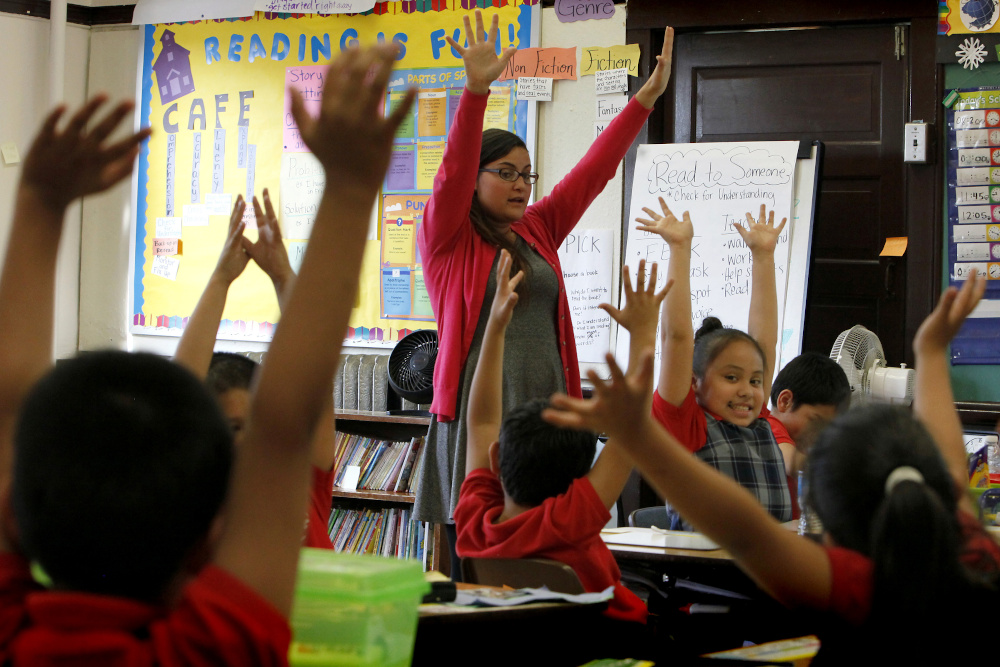
Maria Rodriguez, part of the University of Notre Dame's Alliance for Catholic Education program, exercises with her third-grade students during class Oct. 20, 2014, at Maternity of the Blessed Virgin Mary School in Chicago. (CNS/Karen Callaway)
Alumni and current students of the University of Notre Dame's Catholic education program are calling for reforms to better equip future teachers to understand and address issues of race, power and privilege in the classroom.
More than 440 alumni and students have signed onto an open letter June 11 addressed to leaders of Notre Dame's Alliance for Catholic Education (ACE). The letter requests its teaching fellow program "seriously address the shortcomings of the current program regarding teacher education and formation around race, power, and privilege."
The letter from Notre Dame's past teaching fellows comes as protests and demonstrations have raised systemic racism into the public consciousness across the country and the globe following the death of George Floyd, who was killed while in custody of a white Minneapolis police officer.
"As we have watched these last few weeks play out, it has become clear that police brutality is a symptom of a pervasive, racist system that reaches all parts of our society, including education," the letter said. "In schools, this includes both the explicit and implicit lessons students learn each day. It includes the content taught in History, Language Arts, and Math, but also the lessons embedded in the actions of teachers and leaders: who gets called on in class, who receives extra help after school, who gets sent to the office."
Advertisement
The letter argues that while the teaching fellows program early on provides some diversity training, it leaves the bulk of addressing in classroom issues of racism to informal conversations and self-learning.
"This sends the message to ACE Teaching Fellows that race and privilege in the classroom are non-essential to teaching. They could not be more wrong," the letter said.
The ACE teaching graduates recommended the program launch a 16-week course on addressing race, power and privilege in the classroom. That plan, they said, should be reviewed by external experts, and a strategy for implementation be ready by summer 2021.
Erin Bell, a 2017 graduate of the program, organized and drafted the letter. She said the lack of training around race left her ill-equipped to address dynamics of race and education while teaching at St. Joan of Arc Catholic School, a predominantly black elementary school in New Orleans founded by the Sisters of the Holy Family.
"I really just didn't have much cultural context going into my two years," she told NCR. "And it would have been really helpful to get some explicit training on racial biases and race, power and privilege and how all that sort of starts to show up as a teacher in the classroom." Bell added when she raised the need for such education with faculty, they told her they agreed it was important but there wasn't time to work it in.
Theo Helm, ACE director of communications and advancement, told NCR that John Staud, ACE executive director, responded to Bell in an email June 12. Staud also addressed the need to confront racial justice and exclusion in a June 3 post, writing "Through our scholarship, formation of teachers and leaders, and outreach to under-resourced Catholic schools, we have both the opportunity and responsibility to match our words with actions."
Helm said the alumni letter reflected ongoing discussions within ACE and with its students, and that the proposed 16-week course is under consideration as part of a curricula review process. In the meantime, steps are being taken to better connect ACE's mission to further Catholic education with the fight against racial injustice, Helm said. This summer, ACE teaching fellows will participate in training on implicit bias, and four faculty members will also lead a four-part discussion series on systemic racism. Both programs are expected to continue in coming years. Racial and implicit bias will be a focus during the program's annual fall retreat.
Helm said the ACE teaching fellows program has worked to incorporate throughout its coursework discussions of racial and socioeconomic inequalities and to help teachers think about discrimination and how to better serve students. He added that ACE has formed an advisory committee to come up with new ways to improve understanding of systemic racism, and is also working to improve recruitment of students, faculty and staff of color.
Begun in 1993, Notre Dame's Alliance for Catholic Education was created to strengthen U.S. Catholic schools and expand access to more children and families, particularly those in low-income situations. Students in the two-year teaching fellowship program complete a master's degree while working at under-served elementary and secondary Catholic schools. Each year, ACE teachers work in 120-plus schools around the country with more than 13,500 students, according to the program. Overall, it has worked with 180,000 students in a quarter of the nation's Catholic schools and within almost 70% of U.S. dioceses.
"I think this moment in history with the Black Lives Matter movement and everything that's going on right now is really calling teachers to think seriously about our own practice, and both the content we teach and the ways that we're teaching that content."
— Erin Bell
According to figures ACE provided to NCR, roughly 22% of its recent teaching fellows have been racial or ethnic minorities. Demographic data for ACE-affiliated schools is incomplete, Helm said, but self-reported data from some schools indicated two-thirds of students were people of color. While the alumni letter cited a slightly higher percentage of students of color, Bell said the dynamic of mostly white teaching fellows instructing predominantly diverse classrooms makes boosting training all the more urgent, including examining teachers' own identities and implicit biases.
"I think this moment in history with the Black Lives Matter movement and everything that's going on right now is really calling teachers to think seriously about our own practice, and both the content we teach and the ways that we're teaching that content," she said.
Bell, who now teaches at a tuition-free Catholic school in San Francisco's Tenderloin District, said while at Joan of Arc she had difficulty communicating and connecting with her middle school students. Midway through her first year, she was paired with a mentor, an African American woman with three decades in the classroom, who encouraged her to be more culturally relevant in her lesson plans, from the books they read to discussions about differences in language at school and at home.
"When I started to tailor my content to my students' experiences, their reading was much stronger," she said. In one instance, she taught around a book about Hurricane Katrina, the 2005 storm that decimated many Black neighborhoods in New Orleans.
"I had students who had never finished a chapter book before just tearing through it," Bell said.
It's those types of lessons that Bell and other ACE graduates want to see ingrained as central lessons in the teaching fellows program to ensure all future teachers are better prepared to work with communities of color.
"If ACE is going to be a program that wants to promote social justice and equity then we can't ignore the ways in which we're educating our teachers to do that work. And I know it's hard work, but I think it's really important work."
[Brian Roewe is an NCR staff writer. His email address is broewe@ncronline.org. Follow him on Twitter: @BrianRoewe.]











